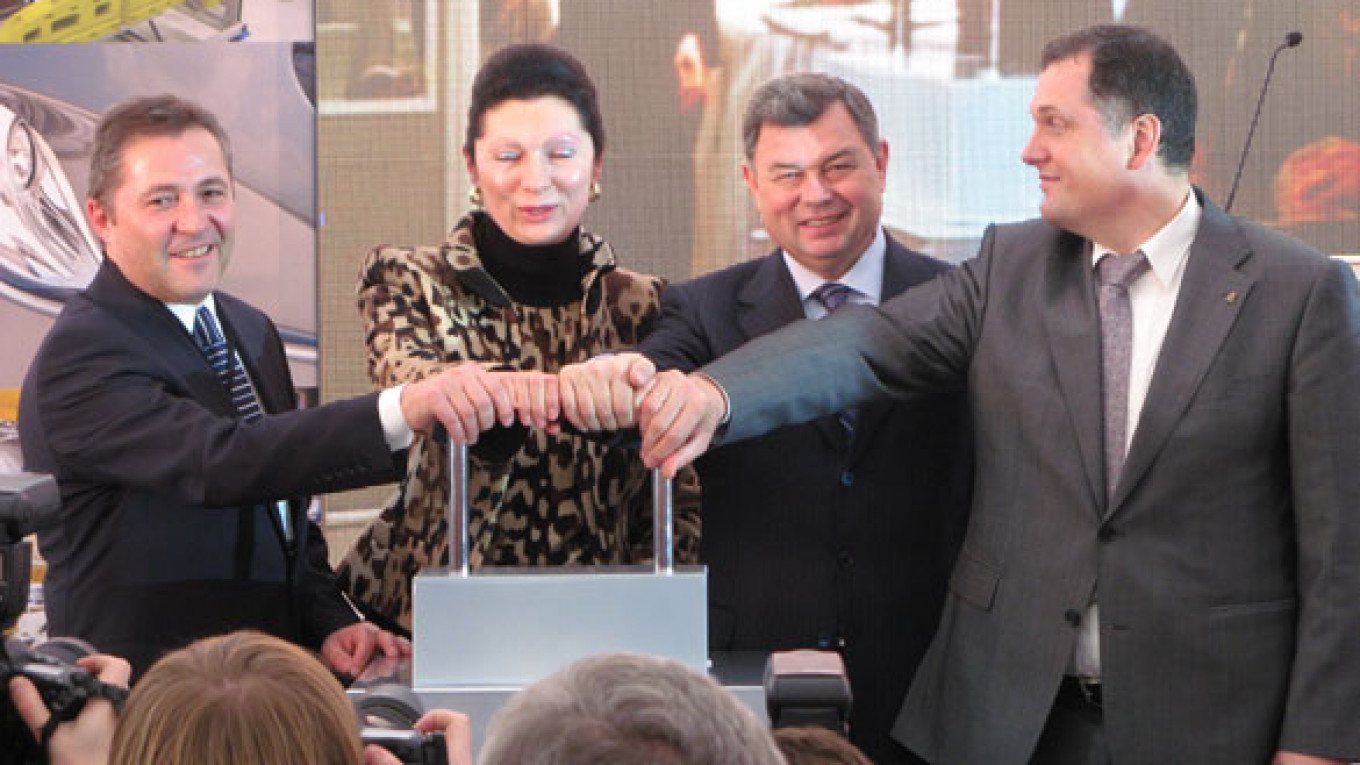KALUGA — Canadian auto parts maker Magna on Thursday launched its new plant in Kaluga, which the company said demonstrated its belief in the strong potential of Russia’s automotive market.
The facility, whose total production area is 15,000 square meters, will manufacture bumpers and front-end modules and will assemble radiator grills and instrument panel-beams.
The company said it was against corporate policy to disclose the volume of investment in the project.
Magna, which already has plants in St. Petersburg and Nizhny Novgorod, chose Kaluga to start the new factory because its major customers — the world’s biggest carmakers — are located in the region, said Hubert Hoedl, the company’s vice president for corporate marketing and business development in Europe.
Among the carmakers that the Magna plant will supply are Volkswagen, Skoda, Renault and Peugeot Citroen.
The plant, which now operates at 25 percent of capacity, is making bumpers for three car models — Volkswagen’s Polo and Skoda’s Octavia and Fabia.
The plant’s chief executive Georgy Rotov said they expect to reach full capacity of 150,000 to 170,000 auto component kits per year by 2012.
The plant will also start supplying auto parts for the new Volkswagen Tiguan and Renault Duster next year, he told reporters during the plant tour, adding that Magna also has orders from Peugeot and Citroen, and is in talks with Mitsubishi.
Manfred Eibeck, president of Magna Russia, said at the opening ceremony that the plant was “a clear indication of our belief in the Russian automotive market and its perspectives for future development and sustainable growth.”
Kaluga Governor Anatoly Artamonov also participated in the opening ceremony and said Magna’s presence confirmed that the region’s economic policy was right.
The Kaluga region, which offers tax breaks to investors, has attracted several leading foreign companies. French automaker Peugeot Citroen and Japan’s Mitsubishi opened a joint enterprise in April, and French cosmetics maker L’Oreal launched its first Russian plant there last month.
Artamonov said he hoped that Magna’s enterprise would contribute to “creating a full-fledged automotive cluster” in the region.
At the end of the ceremony, Artamonov and Magna’s executives signed the first Volkswagen bumper produced at the plant that was later presented to the automaker.
Dietmar Korzekwa, chief executive of Volkswagen Russia, had a careful look at the bumper, saying its quality was “very good” and expressing hope that the components supplied by Magna in future would be of the same quality.
Magna’s executives said they considered Russia a strategic market, which has good potential for growth.
“The automotive market in Russia plays a significant role in our overall global growth strategy of developing business in key growth markets,” said Erwin Winkler, president of Magna Exteriors and Interiors Europe. “As original equipment manufacturers focus on global expansion, the expectation is that their global suppliers are positioned to support them in all regions of the world,” he said in a statement.
Hoedl said Russia’s automotive market was “catching up very fast” and the company believed that the trend would continue in the coming years.
He also said the number of cars per 1,000 people in Russia doesn't exceed 250, which is low compared to Europe, where the figure is 500.
“So there’s some room to grow,” Hoedl told reporters after the opening ceremony.
Magna has already invested up to 250 million euros [$347 million] in Russia,” and there is more to come,” he said.
PricewaterhouseCoopers said earlier this week that car assembly in Russia would recover to the pre-crisis level next year and reach 1.7 million vehicles.
Meanwhile, Magna is facing significant structural changes, with co-chief executive Siegfried Wolf moving to billionaire’s Oleg Deripaska’s Basic Element holding next month.
Wolf will be appointed board chairman at Russian Machines, Basic Element's automotive division, where he will be in charge of strategic business development.
Speaking in an interview with The Moscow Times after the opening ceremony, Wolf said, “After 16 years of successful work with Magna you can believe it was not an easy step for me. … It was a great time.”
Wolf also said that it was “an ideal time” to move to GAZ Group because of Russia’s stable economic growth and “strong political leadership."
He said he expects to bring his experience to GAZ, adding that he hopes to “build up a very competitive company” in cooperation with Deripaska.
“That’s what we are working on already,” Wolf said.
A Message from The Moscow Times:
Dear readers,
We are facing unprecedented challenges. Russia's Prosecutor General's Office has designated The Moscow Times as an "undesirable" organization, criminalizing our work and putting our staff at risk of prosecution. This follows our earlier unjust labeling as a "foreign agent."
These actions are direct attempts to silence independent journalism in Russia. The authorities claim our work "discredits the decisions of the Russian leadership." We see things differently: we strive to provide accurate, unbiased reporting on Russia.
We, the journalists of The Moscow Times, refuse to be silenced. But to continue our work, we need your help.
Your support, no matter how small, makes a world of difference. If you can, please support us monthly starting from just $2. It's quick to set up, and every contribution makes a significant impact.
By supporting The Moscow Times, you're defending open, independent journalism in the face of repression. Thank you for standing with us.
Remind me later.






